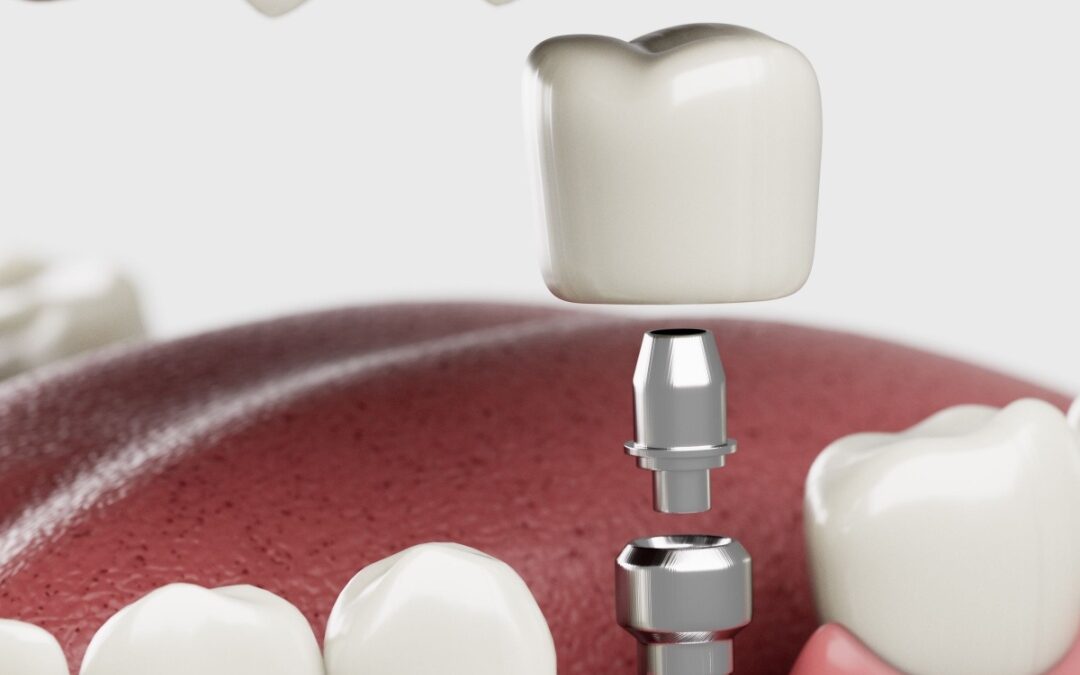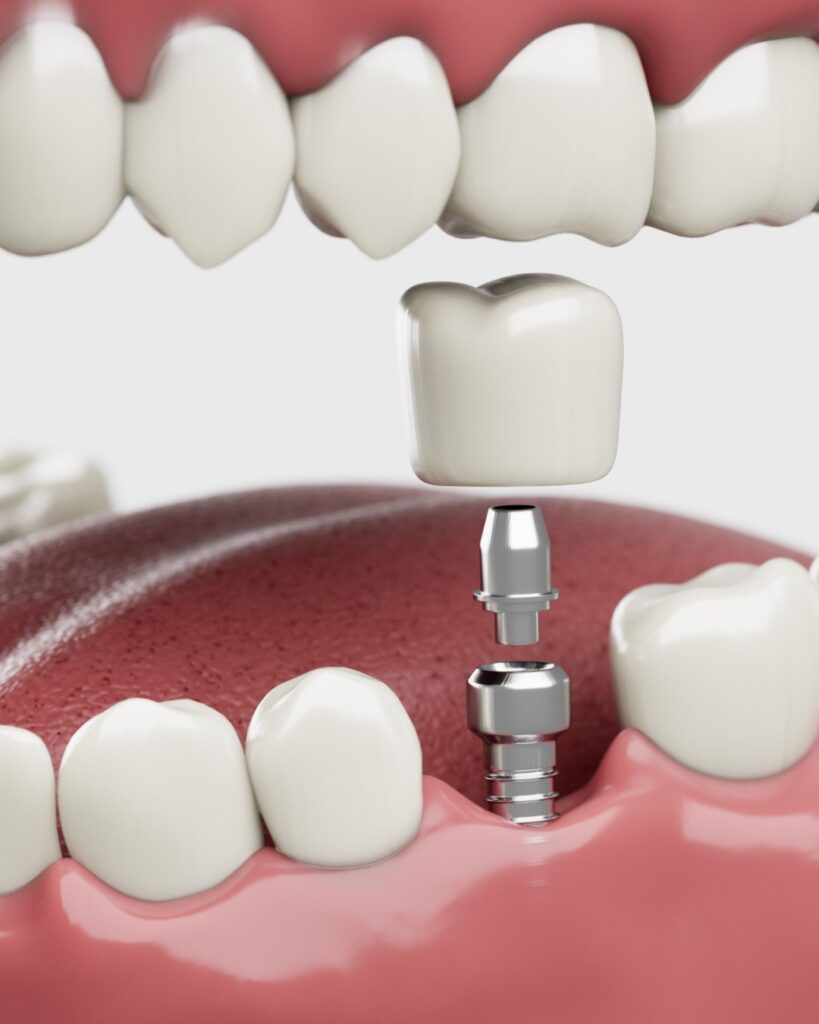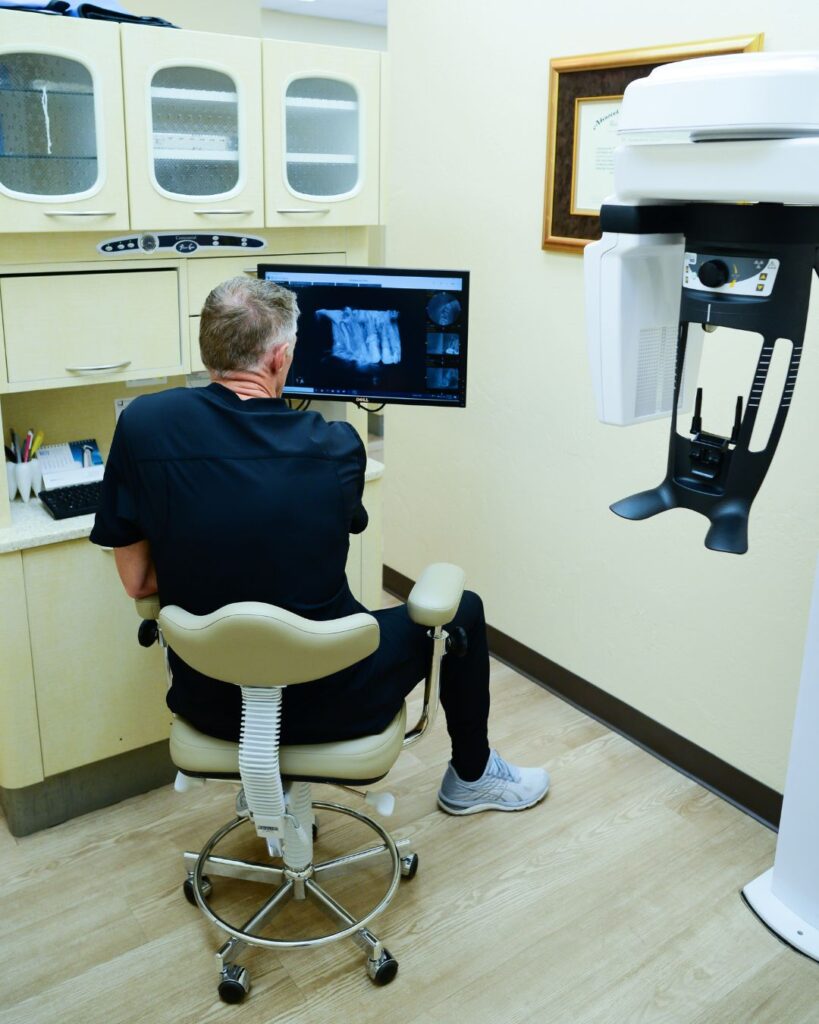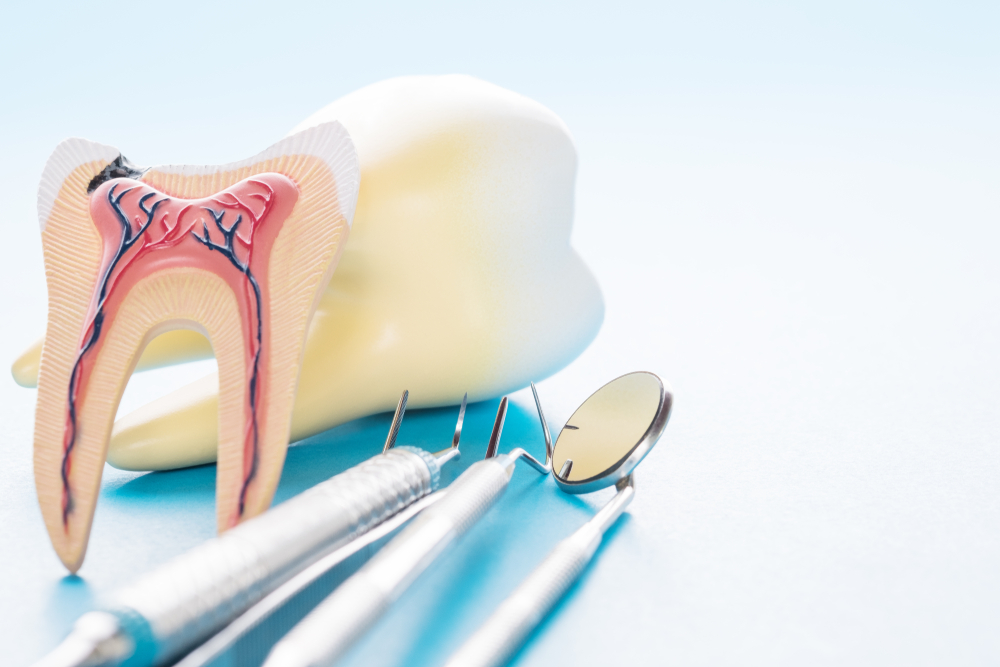
by Dr. Jacqueline S. Allen | Jun 3, 2025 | Dental Implants
 In today’s era of information overload, there’s nothing wrong with focusing on the basics. Trustworthy medical and dental websites often publish pages or posts addressing frequently asked questions or offering a “101” level review of an important topic.
In today’s era of information overload, there’s nothing wrong with focusing on the basics. Trustworthy medical and dental websites often publish pages or posts addressing frequently asked questions or offering a “101” level review of an important topic.
Likewise, here are five facts about dental implants to give you a baseline of understanding, so you can discuss dental implants with your dental professional.
5 Important Facts About Dental Implants
- Dental implants can stop bone loss in your jaw. When teeth are lost due to injury or decay, you lose bone density in your jaw. Implants can prevent this loss and help restore your jaw’s structure by reducing the load on the remaining natural teeth.
- Dental implants can replace one – or all – of your teeth. While the methods vary, implants can be used to replace one, a few, an entire arch, or even all your teeth. Dental implants place biocompatible metal posts where the tooth roots have been, adding an artificial tooth restoration above the gum line.
- Dental implants need time to osseointegrate into your jaw. Some patients can get “teeth in a day” dental implants; others require multiple visits to supplement the jaw with bone grafts and other steps to ensure success. It’s important to understand the posts placed below the gum line will need time to bind with the bone in your jaw to function at their maximum effectiveness. This process, known as osseointegration, can take several months.
- Dental implants require a post-procedure recovery plan. Immediately after your dental implants are placed, you will need a recovery period. You’ll need to eat a soft-food diet and monitor your mouth carefully for signs of infection at the implantation site. The initial healing can take one or two weeks. Osseointegration, as mentioned above, can take six to eight weeks.
- Dental implants can create dramatic improvements in how you speak, eat, and smile. Dental implants are popular because they reverse the negative legacy of natural tooth loss. Many patients report being able to eat all the foods they used to love, speak with greater clarity and diction and – best of all! – feel comfortable smiling and laughing in ways that show off their smiles.
If you have lost one or more teeth, you can schedule a visit with your endodontist or other dental professional to assess your current oral health and develop a treatment plan based on your individual needs.
Call Our Office Today For Answers To Your Dental Implant Questions
Don’t let lack of knowledge about dental implants stand between you and better oral health. Call 602-242-4745 to make an appointment with the Phoenix Endodontic Group to discuss dental implants today.

by Dr. Jacqueline S. Allen | May 1, 2025 | Root Canal, Root Canal Aftercare
Following a root canal, success depends on more than what your doctor, dentist, or endodontist does – you play a critical role in recovery by paying close attention to your aftercare instructions.
aftercare instructions.
In this post, we’ll look at three important areas of root canal aftercare: pain management, post-procedure food choices, and daily oral care. Monitoring these areas after your root canal helps your body heal well and lays the groundwork for continuing good health.
Root Canal Aftercare Tips To Enhance Your Recovery
After your root canal, you’ll leave the office with any written recovery directions your practitioner has for you. Your next steps are easy: relax, wait for the local anesthesia to wear off before eating, and pay attention to how you feel.
- Pain Management – You may feel sensitivity in the treated tooth. This can be managed with over-the-counter pain relievers. If you feel severe pressure or pain in the tooth, call your endodontist promptly for a consultation.
- Post-Procedure Diet – Eat a soft-food diet for a short period after treatment to facilitate recovery. Recommended options include scrambled eggs, yogurt, mashed potatoes, lukewarm soups, meatloaf, pasta, and cooked or canned fruit. Avoid sticky foods, hard foods, and extremely hot or cold food and drink.
- Daily Oral Care – Your endodontist may direct you to swish with salt water for the first few days after your root canal. Beyond that, maintain your daily dental care routine, including flossing (be careful around the treated tooth), and twice-daily brushing.
Don’t Forget Your Crown!
A critical part of root canal aftercare involves returning to your general dentist to have a crown placed on the treated tooth. This protects your natural tooth from further damage and decay. You should have this done within a week or two of your root canal.
Call Our Office Today To Discuss Your Root Canal Aftercare Plan
The staff at the Phoenix Endodontic Group is happy to walk you through your root canal aftercare plan and answer any questions concerning your recovery. Call us at 602-242-4745 to make an appointment. We offer emergency treatment options during or outside regular office hours.

by Dr. Jacqueline S. Allen | Apr 4, 2025 | Root Canal
When a tooth gets injured or infected, you just want the pain to stop. Tooth extraction can sound like an alternative to a root canal, especially when only one tooth is involved. However, it’s important to look beyond the moment when a natural tooth is at risk.
involved. However, it’s important to look beyond the moment when a natural tooth is at risk.
Sometimes an extraction is the only choice because the tooth is cracked or injured, or because the decay is pervasive. Often, though, endodontists can repair a damaged natural tooth with root canal treatment. Let’s review a few reasons why saving a natural tooth through a root canal is better than having it extracted.
Root Canals Vs. Tooth Extractions: Which Is Best?
- Root canals protect your natural teeth from further damage. Root canal treatments thoroughly clean and disinfect the roots of your teeth. The final step also prevents infection from returning by filling the tooth canals with biocompatible material and placing a crown.
- Root canals keep your natural smile. Dentures, dental implants, or bridges – types of restorations used following tooth extraction – don’t function or look as well as your natural teeth. Endodontists can use root canals or related endodontic treatments to save even badly damaged natural teeth.
- Missing teeth result in cascading dental problems. One extracted tooth can cause your remaining teeth to shift. Multiple extracted teeth can result in bone loss in the jaw and a noticeable “sag” in the lower third of your face. Keeping your natural teeth prevents this.
- Root canals may actually be less painful! Despite what many people think, today’s root canal treatments are usually done under local or IV sedation anesthesia and have little or no pain afterwards. According to the American Association of Endodontists, patients who undergo root canals are six times more likely to describe the experience as painless than those who opt for tooth extraction.
Call Our Office For An Initial Consultation
At Phoenix Endodontic Group, our skilled staff can review your case to determine the best plan for preserving your natural teeth. Call us at 602-242-4745 to make an appointment. We offer emergency treatment options during or outside of regular office hours.

by Dr. Jacqueline S. Allen | Mar 10, 2025 | Dental Emergency, Dentistry, Endodontist
Like any medical emergency, dental emergencies require your quick response. If you have an injured tooth, it’s important that you see an endodontist immediately.
You should call 911 and head to an emergency room if an injured tooth has caused an abscess and you are having trouble breathing or swallowing, or if your jaw is broken. Otherwise, call your endodontist for an emergency appointment. At Phoenix Endodontic Group, we can provide emergency care 24/7, so call as soon as you need us, day or night.
Here is a quick guide to ways an endodontist might repair a tooth injury.

How Endodontists Treat Common Tooth Injuries
- If you come to your endodontist with a chipped or cracked tooth – they may recommend reattaching the tooth part with bonding material, placing a crown on the tooth to protect it from further damage, or performing a root canal if the crack in the tooth caused injury to its nerve.
- If you present with a dislodged or knocked-out tooth – they will want to know how recently the injury occurred. Teeth that have been knocked out of the mouth can sometimes be successfully placed back in the mouth if the patient sees an endodontist within 30 to 60 minutes of the incident. Avoid touching the root surface of the injured tooth and handle it carefully. For dislodged teeth, it may be possible for the endodontist to push the tooth back into place and stabilize it. Dislodged teeth sometimes also require root canal treatment.
- If you come in with a horizontal fracture – they will take images to determine the location of the fracture. A fracture near the tooth’s root may be able to be treated with a stabilizing splint, and possibly a root canal. A fracture across the root closer to the gum line is harder to treat and may result in the tooth having to be extracted.
Following many tooth injuries, your endodontist will recommend an annual check for root resorption, where your body rejects the injured tooth and dissolves the tooth root structure.
Don’t Delay – Call Our Office Immediately About Your Injured Tooth
Never delay treatment of an injured tooth. Call us at 602-242-4745 to make an appointment. Our practice offers emergency treatment options to ensure you can get the right treatment when you need it.

by Dr. Jacqueline S. Allen | Feb 5, 2025 | Cracked Teeth, Dental Pulp

Our natural teeth have a tough outer layer of enamel, but it’s not impenetrable. Underneath the enamel and dentin lies dental pulp (soft tissue, nerves and blood vessels). Pulp carries nutrients and blood to enamel and underlying dentin to keep teeth alive and healthy. Cracks, chips or erosion of tooth enamel allow bacteria to enter the tooth, causing dental pulp concerns.
Endodontists are specialists who focus their dental practice on preserving natural teeth and treating problems with dental pulp. Let’s look at what happens when dental pulp becomes inflamed and explore how endodontists treat these issues.
Understanding The Impact Of Dental Pulp Infections
Pulpitis refers to an irritation of dental pulp. Endodontists use diagnostic procedures such as electric pulp testing and tapping tests to determine the extent of the inflammation.
Reversible pulpitis happens when the dental pulp is alive and the natural tooth can recover. The infected pulp can be removed and a normal filling placed in the tooth to prevent further damage.
Unchecked, it becomes irreversible and the natural tooth cannot recover without more invasive treatment. The pulp may actually die, a condition known as pulp necrosis. A severe infection in the pulp can spread and cause an abscess if not treated. Abscesses can lead to life-threatening complications, so getting endodontic treatment fast can be life-saving.
How Endodontists Treat Pulpitis
Treatments for pulpitis fall into three major categories: treatments that can limit the damage; treatments that replace dental pulp with a biocompatible alternative; and treatments that involve removing the natural tooth.
For pulpitis in early stages, an endodontist may remove the damaged pulp and add a crown to resolve the issue. If the condition becomes irreversible, though, they will perform a root canal to remove all of the affected tooth’s dental pulp, clean the tooth roots and replace the pulp with gutta-percha or a similar filling.
If the outer structure of the natural tooth cannot be strengthened with a crown and/or a post and core, tooth extraction may be the only remaining option. It may be replaced with a dental implant or bridge.
Your endodontist can answer questions about how to treat your dental pulp infection and what the prognosis is for saving your natural tooth.
Call Our Office For A Dental Pulp Evaluation
If you’re concerned you may have a dental pulp problem, call our office at 602-242-4745 for an evaluation. Our practice offers 24/7 emergency treatment options to ensure you can access the right treatment whenever you need it.

 In today’s era of information overload, there’s nothing wrong with focusing on the basics. Trustworthy medical and dental websites often publish pages or posts addressing frequently asked questions or offering a “101” level review of an important topic.
In today’s era of information overload, there’s nothing wrong with focusing on the basics. Trustworthy medical and dental websites often publish pages or posts addressing frequently asked questions or offering a “101” level review of an important topic.

 aftercare instructions.
aftercare instructions.
 involved. However, it’s important to look beyond the moment when a natural tooth is at risk.
involved. However, it’s important to look beyond the moment when a natural tooth is at risk.

